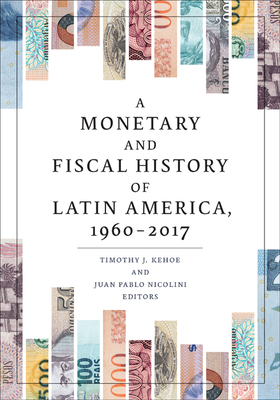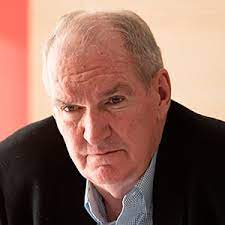

 University of Minnesota Press
University of Minnesota Press
A Monetary and Fiscal History of Latin America, 1960-2017


Key Metrics
- Timothy J Kehoe
- University of Minnesota Press
- Paperback
- 9781517911362
- 10 X 7 X 1 inches
- -
- Business & Economics > Economic History
- English
 Secure Transaction
Secure TransactionBook Description
A major, new, and comprehensive look at six decades of macroeconomic policies across the region
What went wrong with the economic development of Latin America over the past half-century? Along with periods of poor economic performance, the region's countries have been plagued by a wide variety of economic crises. This major new work brings together dozens of leading economists to explore the economic performance of the ten largest countries in South America and of Mexico. Together they advance the fundamental hypothesis that, despite different manifestations, these crises all have been the result of poorly designed or poorly implemented fiscal and monetary policies.
Each country is treated in its own section of the book, with a lead chapter presenting a comprehensive database of the country's fiscal, monetary, and economic data from 1960 to 2017. The chapters are drawn from one-day academic conferences--hosted in all but one case, in the focus country--with participants including noted economists and former leading policy makers. Cowritten with Nobel Prize winner Thomas J. Sargent, the editors' introduction provides a conceptual framework for analyzing fiscal and monetary policy in countries around the world, particularly those less developed. A final chapter draws conclusions and suggests directions for further research.
A vital resource for advanced undergraduate and graduate students of economics and for economic researchers and policy makers, A Monetary and Fiscal History of Latin America, 1960-2017 goes further than any book in stressing both the singularities and the similarities of the economic histories of Latin America's largest countries.
Contributors: Mark Aguiar, Princeton U; Fernando Alvarez, U of Chicago; Manuel Amador, U of Minnesota; Joao Ayres, Inter-American Development Bank; Saki Bigio, UCLA; Luigi Bocola, Stanford U; Francisco J. Buera, Washington U, St. Louis; Guillermo Calvo, Columbia U; Rodrigo Caputo, U of Santiago; Roberto Chang, Rutgers U; Carlos Javier Charotti, Central Bank of Paraguay; Sim�n Cueva, TNK Economics; Juli�n P. D�az, Loyola U Chicago; Sebastian Edwards, UCLA; Carlos Esquivel, Rutgers U; Eduardo Fern�ndez Arias, Peking U; Carlos Fern�ndez Valdovinos (former Central Bank of Paraguay); Arturo Jos� Galindo, Banco de la Rep�blica, Colombia; M�rcio Garcia, PUC-Rio; Felipe Gonz�lez Soley, U of Southampton; Diogo Guillen, PUC-Rio; Lars Peter Hansen, U of Chicago; Patrick Kehoe, Stanford U; Carlos Gustavo Machicado Salas, Bolivian Catholic U; Joaqu�n Marandino, U Torcuato Di Tella; Alberto Martin, U Pompeu Fabra; Cesar Martinelli, George Mason U; Felipe Meza, Instituto Tecnol�gico Aut�nomo de M�xico; Pablo Andr�s Neumeyer, U Torcuato Di Tella; Gabriel Oddone, U de la Rep�blica; Daniel Osorio, Banco de la Rep�blica; Jos� Peres Caj�as, U of Barcelona; David Perez-Reyna, U de los Andes; Fabrizio Perri, Minneapolis Fed; Andrew Powell, Inter-American Development Bank; Diego Restuccia, U of Toronto; Diego Saravia, U de los Andes; Thomas J. Sargent, New York U; Jos� A. Scheinkman, Columbia U; Teresa Ter-Minassian (formerly IMF); Marco Vega, Pontificia U Cat�lica del Per�; Carlos V�gh, Johns Hopkins U; Fran�ois R. Velde, Chicago Fed; Alejandro Werner, IMF.
Author Bio
Tim Kehoe received his B.A. in Economics and Mathematics from Providence College in 1975 and his Ph.D. from Yale University in 1979. He has taught at Wesleyan University, the Massachusetts Institute of Technology, and the University of Cambridge in England. Since 1987 Tim has been a Professor in the Department of Economics at the University of Minnesota where he is currently Distinguished McKnight University Professor.
He is also an adviser at the Federal Reserve Bank of Minneapolis. His research and teaching focus on the theory and application of general equilibrium models. Tim has advised the Spanish government on the impact of joining the European Community in 1986, the Mexican government on the impact of joining NAFTA in 1994, and the Panamanian government on the impact of unilateral foreign trade and investment reforms in 1998.
Source: The University of Minnesota
Videos
No Videos
Community reviews
Write a ReviewNo Community reviews